Love your aar! Cant wait how ww2 turns out! Cant stay out if Germany attacks your comrads in the USSR!
Rojo y Negro - Iberia in the 20th Century
- Thread starter gll25
- Start date
-
We have updated our Community Code of Conduct. Please read through the new rules for the forum that are an integral part of Paradox Interactive’s User Agreement.
You are using an out of date browser. It may not display this or other websites correctly.
You should upgrade or use an alternative browser.
You should upgrade or use an alternative browser.
Excellent update, good sir. It appears that the Popular Front is beginning to lose some cohesion now that it collectively represents the entire acceptable political spectrum. I imagine that the lack of an agreement on the right direction for Iberia will make it hard to implement major changes unless some factions are willing to make concessions. Every faction (except, perhaps, the socialists) wants radical structural change, and would likely be outraged if any actual change occurs not in line with their respective visions.
A prediction, if I may: As I don't see even one party willing to make significant concessions, there will be a policy deadlock. With factional dissent rising, one faction, likely whichever is best organized and led, will make a bid to seize power in the form of a coup, perhaps resulting another stage of civil war.
In any case, I can't wait to see what happens and I know it will be fascinating.
A prediction, if I may: As I don't see even one party willing to make significant concessions, there will be a policy deadlock. With factional dissent rising, one faction, likely whichever is best organized and led, will make a bid to seize power in the form of a coup, perhaps resulting another stage of civil war.
In any case, I can't wait to see what happens and I know it will be fascinating.
Unlike there's a foreign threat, the Spaniards are going to waste their time in one of their favourite sports: quarrelling among themselves.
They are too strong now to be undermined that easilyWell it seems the POUM and CP have grown tremendously over the course of the war (both parties were pretty small prior to the CW). I would have expected the Socialists, Communists and Republican Lefts to try to work together a bit more to undermine the revolutionaries (as happened IRL). No matter what, this regime looks fragile. Not long to go now until the outbreak of war!
ThanksLove your aar! Cant wait how ww2 turns out! Cant stay out if Germany attacks your comrads in the USSR!
Thanks, glad you're enjoying itExcellent update, good sir. It appears that the Popular Front is beginning to lose some cohesion now that it collectively represents the entire acceptable political spectrum. I imagine that the lack of an agreement on the right direction for Iberia will make it hard to implement major changes unless some factions are willing to make concessions. Every faction (except, perhaps, the socialists) wants radical structural change, and would likely be outraged if any actual change occurs not in line with their respective visions.
A prediction, if I may: As I don't see even one party willing to make significant concessions, there will be a policy deadlock. With factional dissent rising, one faction, likely whichever is best organized and led, will make a bid to seize power in the form of a coup, perhaps resulting another stage of civil war.
In any case, I can't wait to see what happens and I know it will be fascinating.
:rofl: Yeah, thats true :rofl:Unlike there's a foreign threat, the Spaniards are going to waste their time in one of their favourite sports: quarrelling among themselves.
The next update contains stuff that were extremely unlikely to happen IRL, but I have done it anyway to make the AAR even more interesting. Also forgive me in advance for the fourth image, I had to do it
Last edited:
Interbellum
The Western Schism
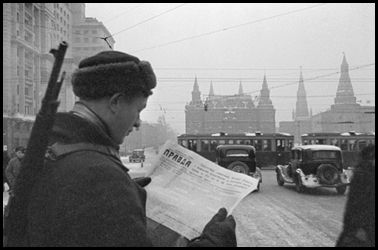
Soldier reading the influential Pravda in Moscow
The Western Schism

Soldier reading the influential Pravda in Moscow
The repression of Trotskyists and other anti-Stalinist groups in the Soviet Union and throughout the Comintern, was not a new thing, as it was happening since the forced exile of Trotsky from the USSR, and getting harsher every year. Thus, it was nothing beyond obvious to expect the Soviet government to show their dissatisfaction with the presence of Trotskyist elements in the Spanish power structure. This happened shortly after the elections, on April 20, when the leadership of the PCI and the PSOU were called for a meeting with the Soviet ambassador, where they received a letter signed by Maxim Litvinov, Commissar for Foreign Affairs, demanding the suppression of counter-revolutionary elements in Spain, namely the Trotskyists and the Anarchists. The communist and socialist leaders did not have much sympathy for both these factions, but they knew how strong they were, and that it was not wise to attempt a crackdown. The Soviet ambassador left the meeting empty-handed, after receiving a polite no from the Iberians.
The Soviet leader, Joseph Stalin, was extremely angry and disappointed with the Iberian leadership, and this became clear for the whole world when, in the day after the meeting, an article was published in Pravda, called “Iberian Treachery”, violently criticizing the Federation’s government, denouncing them and the system they created in Iberia as a misrepresentation of Leninism, designed to fool and enslave the people. The answer came the following day in the official periodical of the Iberian government, called The Federation, who denounced the USSR's attempt to meddle in internal matters of the country, calling it “Soviet imperialism”, while the newspapers of the PCI remained silent on the matter. A deep split had clearly occurred between the two countries, and thus the Federation lost one of its main allies.
The Iberian disobedience was the last straw for Stalin, who decided to annihilate any opposition to his government, starting the Great Purge, which in Russia is called Yezhovshchina due to Nikolai Yezhov, head of the NKVD at the time, and the assassination of Sergey Kirov, one of Stalin’s greatest allies, was used as an excuse to begin the crackdown. The first victims were the former members of the so-called Right Opposition, notably its leaders, the Old Bolsheviks Nikolai Bukharin, Alexei Rykov, and Mikhail Tomsky. They were all tried and convicted in the first of the Moscow Show Trials, on May 17, 1938, and were executed the next day. This was only the beginning however, as Stalin's objective was to completely purge the Soviet military from possible dissidents and to eventually kill or arrest all of the Old Bolsheviks, thus eliminating any possibility of political opposition. The Stalinist terror continued for nearly two years, taking the lives of at least half a million people, and even though it succeeded in destroying any kind of internal opposition, it failed to completely accomplish the elimination of the remaining leaders from the civil war period, and this would be decisive in the international sphere.
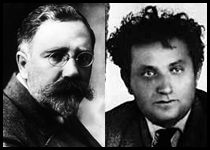
The defectors
Two men managed to escape Stalin’s deadly claws, narrowly escaping Moscow after they correctly predicted they were next in the dictator’s list. Grigory Zinoviev and Lev Kamenev defected to France in May 22, 1938, and even though the PCF initially repeatedly demanded their extradition to the Soviet Union, they were granted political asylum in France after giving strong evidence their life would be in danger if they returned to the USSR. Stalin and the NKVD had underestimated the two Old Bolsheviks, and the man responsible for their arrest, Genrikh Yagoda, paid the price, being imprisoned and executed less than a week later.
The defection of Zinoviev and Kamenev cracked the political stability of the Comintern. The purges were recognized by the Soviet leadership, shown to the world as the elimination of counterrevolutionaries in the hierarchy of power, but the information brought by the two defectors presented a different perspective, with both men claiming it was nothing more than a massive crackdown against any kind of opposition towards Stalin in the Soviet society. On May 24, 1938, the biggest newspaper of France, Le Petite Parisien, placed the two deserters on the cover of the edition, and inside the periodical there was an article several pages long, which included interviews with Zinoviev and Kamenev, and pictures of a few documents they obtained with their remaining allies in Moscow, which somewhat proved the existence of persecution. The Soviet government quickly and vehemently denied the accusations, but the doubt was cast.

Maurice Thorez
The accusations against Stalin, made by nothing more nothing less than two senior Bolshevik leaders of the October Revolution, only increased the dissatisfaction of some members of the Comintern with the Soviet Union. Communist parties of Western Europe, which were very strong in their countries, were not happy with the extreme centralization of the Third International, as they were practically mere puppets of Moscow. The first dissent came from the PCF, after leader Maurice Thorez condemned Stalinism in a speech to the party leadership early on June. The French considered themselves the fathers of modern revolution, and wanted to bring the center of the communist movement westward, to Paris, since the first socialist experience happened there, in 1871, and so abandoned Stalinism as their official ideology, moving towards a pure and original form of Marxism-Leninism. The Italian Communist Party, which had all its leadership exiled in France, not surprisingly followed the example of their hosts, with Palmiro Togliatti supporting Thorez on his move away from Moscow. Both parties were banned from the Comintern on June 7, 1938.
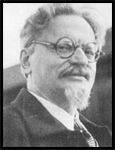
"I'm back, bitches"
The Western Schism was beginning to wane in mid-June when it received a much needed boost coming from Mexico. Leon Trotsky, after due deliberation, decided to travel to Europe, and arrived from America in Lisbon on June 15, being more than welcome by the Iberian government, which was very unhappy with Soviet policies. The PCI showed no opposition, and this led to the forceful withdrawal of the party from the Comintern, a move they were already considering to take voluntarily. Trotsky came into contact with the two deserters in France, and after brief negotiations, they opted to leave the old differences aside and arrange a meeting, which was to be held in Iberia.
The Summit of Bilbao began on June 28, and it was decisive for the organization of a common resistance against Stalinism. In it were present, aside from the three Bolsheviks, delegations from the communist parties of France, Italy and Iberia, from the POUM, and from the new Marxist Unity Party (PUM), a French Trotskyist movement created by former SFIO members Alexandre Bachelet and Maurice Pivert. Trotsky, Kamenev, and Zinoviev agreed to recreate their United Opposition of the twenties, but this time on international level. A new alliance of communist movements, joined by all the parties present, with the clear intention of toppling Stalinism, was created, receiving the name of Fourth International –United Opposition. The Communist movement was irreversibly split in two.
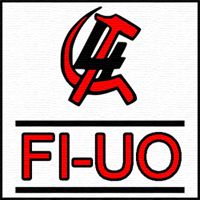
Communist Parties of this era would never consider breaking with the Soviet Union. Until perhaps 1948 (Tito's split) or 1956 (Khruschev's speech and Hungarian Rising), the idea being a Communist and a revolutionary meant than anything other than unconditional support for the Soviet Union was acceptable was an alien idea to all but a small number of dissidents. Perhaps the Spanish Party splitting, its in government afterall, might be possible - especially of the mitigating circumstances of the Trot and Anarchist power. But the French Party? And Thorez of all people? Seems strange.
Oh well. On the other hand, seems Leon has saved Mercader the trip across the Atlantic.

Oh well. On the other hand, seems Leon has saved Mercader the trip across the Atlantic.
ThanksInteresting, very interesting.
I know, I knowCommunist Parties of this era would never consider breaking with the Soviet Union. Until perhaps 1948 (Tito's split) or 1956 (Khruschev's speech and Hungarian Rising), the idea being a Communist and a revolutionary meant than anything other than unconditional support for the Soviet Union was acceptable was an alien idea to all but a small number of dissidents. Perhaps the Spanish Party splitting, its in government afterall, might be possible - especially of the mitigating circumstances of the Trot and Anarchist power. But the French Party? And Thorez of all people? Seems strange.
Oh well. On the other hand, seems Leon has saved Mercader the trip across the Atlantic.

Interbellum
The Road to War
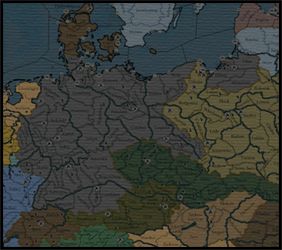
The Germany of Versailles
The Road to War

The Germany of Versailles
The Weimar Republic was the second incarnation of a German unified state, established after the German Empire was toppled. The federal republic entered history with this name because the constitutional assembly took place in the Thuringian city of Weimar, but its official name was Deutsche Reich, or German Realm. The Weimar Republic signed the Treaty of Versailles on behalf of Germany, and throughout its short life, it managed to partially fulfill the terms of the treaty, and to maintain a democratic and liberal state in Germany. After a mere fourteen years however, the republic could not resist the growing political extremism caused by the Great Depression, and effectively ceased to exist with the rise to power of Adolf Hitler.
The coming to power of the Nazi Party completely changed the situation in Germany. The NSDAP since its inception had a clear agenda of extreme nationalism, rearmament and expansionism, and this was quickly put into practice. Hitler started a covert plan of massive rearmament of the German military, creating an air force, which was strictly prohibited by the treaty, and expanding the army. The policy of appeasement, practiced by the British government, began at this time, with the establishment of treaties like the Anglo-German Naval Agreement, signed on June 18, 1935, which allowed the German navy to expand beyond the limits imposed in Versailles, but restricted it to a maximum 35% of the total tonnage of the Royal Navy.
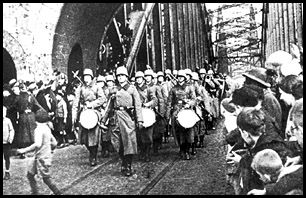
Wehrmacht marching on the Rhineland
The German leadership decided to undertake more radical measures, and German troops entered the Rhineland for the first time after the end of the Great War in March 7, 1936, in a clear violation of the terms of Versailles, since the treaty defined the area as demilitarized zone. France immediately issued a statement, condemning the German actions and threatening full mobilization and invasion, but the reality was that, because of the economic crisis, was in no condition to wage war, and would only fight one if it needed to, and with British support. The United Kingdom successfully attempted to constrain the French, signaling the possibility of a “continental commitment” in the case of a German invasion, and so Hitler got away with it and war was avoided temporarily.
The Heim ins Reich (Back to the Reich) was a foreign policy adopted by Nazi Germany, based on the ethnic expansionism defended not only by the NSDAP since the day it was created, but by all radical nationalist groups in the history of Germany. The aim of this initiative was to convince all ethnic Germans living outside the Third Reich, such as in Austria, Poland, and Sudetenland, that they should strive to bring these regions they inhabited “home” into the unified Großdeutschland. This doctrine was the main justification for German expansionism in the late 30’s and eventually one of the factors leading to a second world war.
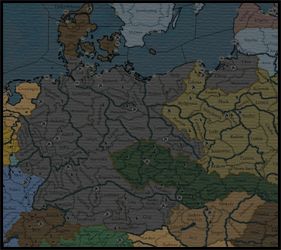
Germany after the Anschluß
The first practical application of the Heim ins Reich happened in 1938, with the Anschluß. Austria was since 1933 under the rule of a fascist organization, the Fatherland Front, but they were contrary to the annexation of Austria to Germany, claiming that the Catholic culture of their country would be destroyed by German Protestantism. The government of Engelbert Dollfuss suppressed the DNSAP, the Austrian incarnation of the Nazi Party, but this did not prevent the continued growth of the movement. The first attempt by the National Socialist movement to take power in Austria happened in the July Putsch of 1934, when 150 SS men disguised as Bundesheer soldiers attacked the Austrian Chancellery. They managed to kill Dollfuss and start a nationwide uprising, but eventually they were crushed by loyalist military units. This was only the beginning however, as Nazi influence in Austria continued to grow, until the political problems reached an apex in 1938. Trying to ease the tension, Chancellor Kurt Schuschnigg attempted to hold a referendum for a vote on the issue, expecting Austrians to vote in favor of maintaining autonomy, but his plans were crushed in March 11, when a well-planed coup d’état by the DSNAP managed to seize control of state institutions in Vienna, and the Nazi leader Arthur Seyß-Inquart was declared chancellor. The following day, the Wehrmacht crossed the border and took control of Austria, effectively annexing the country. International reaction was moderate, and the Western Allies, continuing their policy of appeasement, showed Hitler how weak they were, and this only increased the Führer’s confidence.
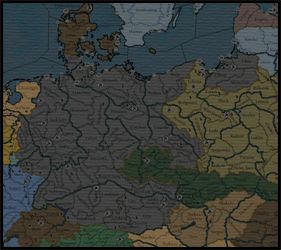
Germany after the Munich Agreement
The next step taken by Germany was the annexation of the Sudeten regions. National Socialism was extremely popular in the German areas of Czechoslovakia, and the fascist Sudeten German Party was extremely powerful, being the biggest party in both the Chamber of Deputies and the Senate of the country. Shortly after the Anschluß, SGP leader Konrad Henlein, instructed by Hitler, issued a series of demands upon the government of Czechoslovakia on April 24, including minority rights and autonomy for the Sudeten Germans. The Czech government agreed to the first condition, but as expected refused the second, and this led to the amassing of German troops on the border, and subsequent mobilization of the Czech army in March 20. War seemed inevitable, but British appeasement managed to postpone it yet again, as Neville Chamberlain was willing to accept almost anything for peace. Leaders of France, Germany, Italy, and the United Kingdom met at Munich in September 1938 to discuss a solution to the crisis, excluding the Soviets and even more surprisingly the Czechs too. The Munich Agreement granted Germany the Sudetenland, while Hitler promised he would go no further. All sides, except the Czechs of course, were apparently satisfied, and Chamberlain’s beliefs he had actually avoided war for Europe led him to declare, in his return to Britain, “I believe it is peace for our time”.
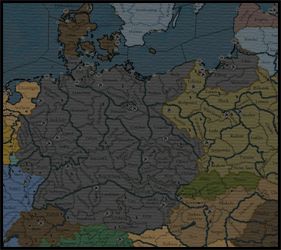
Germany after the Partition of Czechoslovakia and the annexation of Memel
Adolf Hitler however, had no intention of following the agreed conditions. He struck a deal with Hungary and with Jozef Tiso, leader of the Slovak People’s Party, which controlled the assembly on Bratislava. On March 13, 1939, the Slovak Diet declared independence, and two days later, Hitler summoned Czech president Emil Hácha to Berlin. After threatening to bomb Prague, the Führer convinced the Czech leader to order the capitulation of the Czech army, and in the same day the Wehrmacht crossed the border, occupying the country without resistance. Hungarian troops took control of Carpatho-Ukraine and Eastern Slovakia respectively on March 15 and 23. Czechoslovakia was no more. Hitler also used the momentum to successfully claim the Memel Territory from Lithuania on March 20, and this was Germany’s last territorial expansion before the war. The Polish government feared it was next in the Führer’s list, and on March 31, they received a guarantee from France and the United Kingdom which stated that Polish territorial integrity would be defended with their support. War was now just a matter of time.
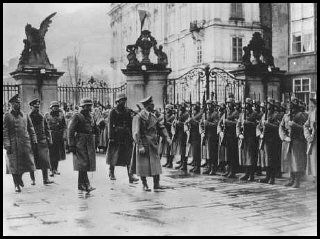
Hitler in the Castle of Prague
A split wit the Soviet Union, so you don’t have to fight the Fascists in June 1941  ... A quick counterrevolution, join the axis and takeover French possessions in North Africa
... A quick counterrevolution, join the axis and takeover French possessions in North Africa  !
!
Anyway keep going, I like
Anyway keep going, I like

